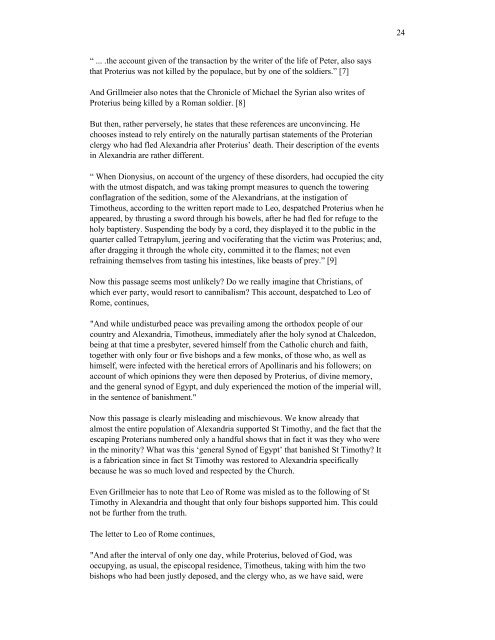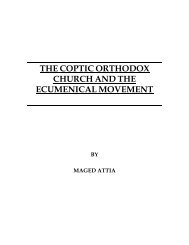Coptic interpretations of the Fourth Ecumenical Council - Saint Mina ...
Coptic interpretations of the Fourth Ecumenical Council - Saint Mina ...
Coptic interpretations of the Fourth Ecumenical Council - Saint Mina ...
Create successful ePaper yourself
Turn your PDF publications into a flip-book with our unique Google optimized e-Paper software.
“ ... .<strong>the</strong> account given <strong>of</strong> <strong>the</strong> transaction by <strong>the</strong> writer <strong>of</strong> <strong>the</strong> life <strong>of</strong> Peter, also says<br />
that Proterius was not killed by <strong>the</strong> populace, but by one <strong>of</strong> <strong>the</strong> soldiers.” [7]<br />
And Grillmeier also notes that <strong>the</strong> Chronicle <strong>of</strong> Michael <strong>the</strong> Syrian also writes <strong>of</strong><br />
Proterius being killed by a Roman soldier. [8]<br />
But <strong>the</strong>n, ra<strong>the</strong>r perversely, he states that <strong>the</strong>se references are unconvincing. He<br />
chooses instead to rely entirely on <strong>the</strong> naturally partisan statements <strong>of</strong> <strong>the</strong> Proterian<br />
clergy who had fled Alexandria after Proterius’ death. Their description <strong>of</strong> <strong>the</strong> events<br />
in Alexandria are ra<strong>the</strong>r different.<br />
“ When Dionysius, on account <strong>of</strong> <strong>the</strong> urgency <strong>of</strong> <strong>the</strong>se disorders, had occupied <strong>the</strong> city<br />
with <strong>the</strong> utmost dispatch, and was taking prompt measures to quench <strong>the</strong> towering<br />
conflagration <strong>of</strong> <strong>the</strong> sedition, some <strong>of</strong> <strong>the</strong> Alexandrians, at <strong>the</strong> instigation <strong>of</strong><br />
Timo<strong>the</strong>us, according to <strong>the</strong> written report made to Leo, despatched Proterius when he<br />
appeared, by thrusting a sword through his bowels, after he had fled for refuge to <strong>the</strong><br />
holy baptistery. Suspending <strong>the</strong> body by a cord, <strong>the</strong>y displayed it to <strong>the</strong> public in <strong>the</strong><br />
quarter called Tetrapylum, jeering and vociferating that <strong>the</strong> victim was Proterius; and,<br />
after dragging it through <strong>the</strong> whole city, committed it to <strong>the</strong> flames; not even<br />
refraining <strong>the</strong>mselves from tasting his intestines, like beasts <strong>of</strong> prey.” [9]<br />
Now this passage seems most unlikely? Do we really imagine that Christians, <strong>of</strong><br />
which ever party, would resort to cannibalism? This account, despatched to Leo <strong>of</strong><br />
Rome, continues,<br />
"And while undisturbed peace was prevailing among <strong>the</strong> orthodox people <strong>of</strong> our<br />
country and Alexandria, Timo<strong>the</strong>us, immediately after <strong>the</strong> holy synod at Chalcedon,<br />
being at that time a presbyter, severed himself from <strong>the</strong> Catholic church and faith,<br />
toge<strong>the</strong>r with only four or five bishops and a few monks, <strong>of</strong> those who, as well as<br />
himself, were infected with <strong>the</strong> heretical errors <strong>of</strong> Apollinaris and his followers; on<br />
account <strong>of</strong> which opinions <strong>the</strong>y were <strong>the</strong>n deposed by Proterius, <strong>of</strong> divine memory,<br />
and <strong>the</strong> general synod <strong>of</strong> Egypt, and duly experienced <strong>the</strong> motion <strong>of</strong> <strong>the</strong> imperial will,<br />
in <strong>the</strong> sentence <strong>of</strong> banishment."<br />
Now this passage is clearly misleading and mischievous. We know already that<br />
almost <strong>the</strong> entire population <strong>of</strong> Alexandria supported St Timothy, and <strong>the</strong> fact that <strong>the</strong><br />
escaping Proterians numbered only a handful shows that in fact it was <strong>the</strong>y who were<br />
in <strong>the</strong> minority? What was this ‘general Synod <strong>of</strong> Egypt’ that banished St Timothy? It<br />
is a fabrication since in fact St Timothy was restored to Alexandria specifically<br />
because he was so much loved and respected by <strong>the</strong> Church.<br />
Even Grillmeier has to note that Leo <strong>of</strong> Rome was misled as to <strong>the</strong> following <strong>of</strong> St<br />
Timothy in Alexandria and thought that only four bishops supported him. This could<br />
not be fur<strong>the</strong>r from <strong>the</strong> truth.<br />
The letter to Leo <strong>of</strong> Rome continues,<br />
"And after <strong>the</strong> interval <strong>of</strong> only one day, while Proterius, beloved <strong>of</strong> God, was<br />
occupying, as usual, <strong>the</strong> episcopal residence, Timo<strong>the</strong>us, taking with him <strong>the</strong> two<br />
bishops who had been justly deposed, and <strong>the</strong> clergy who, as we have said, were<br />
24








